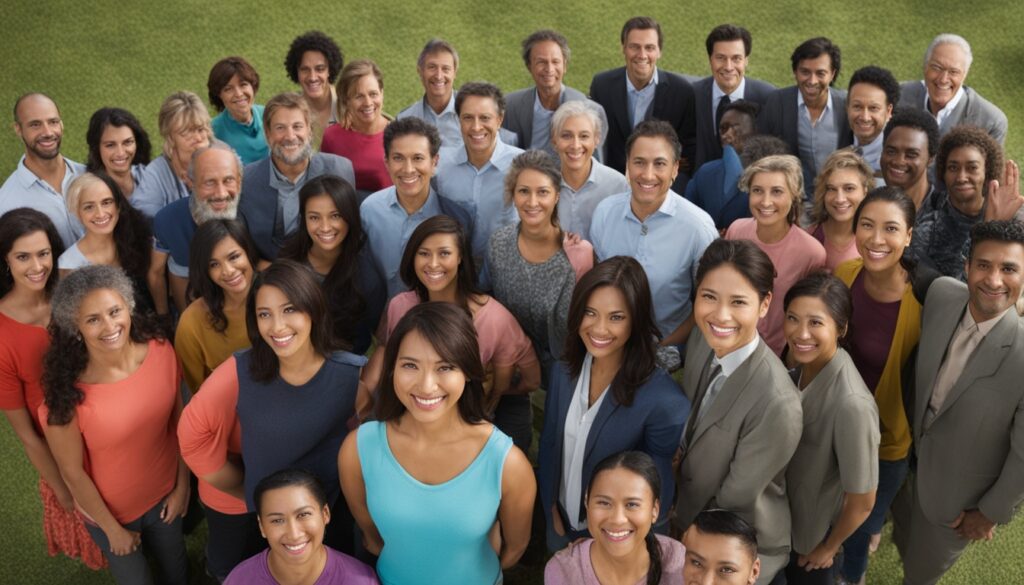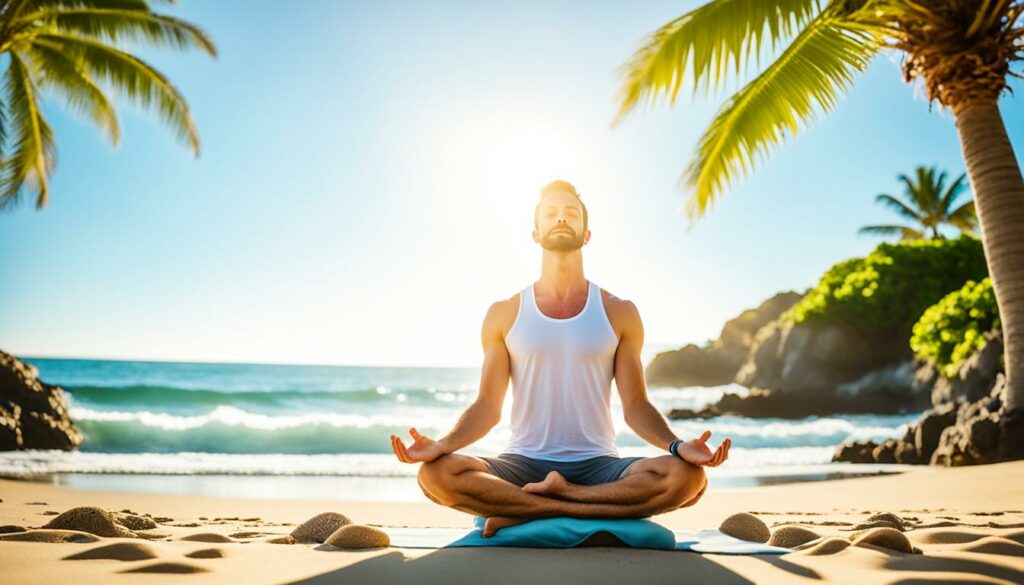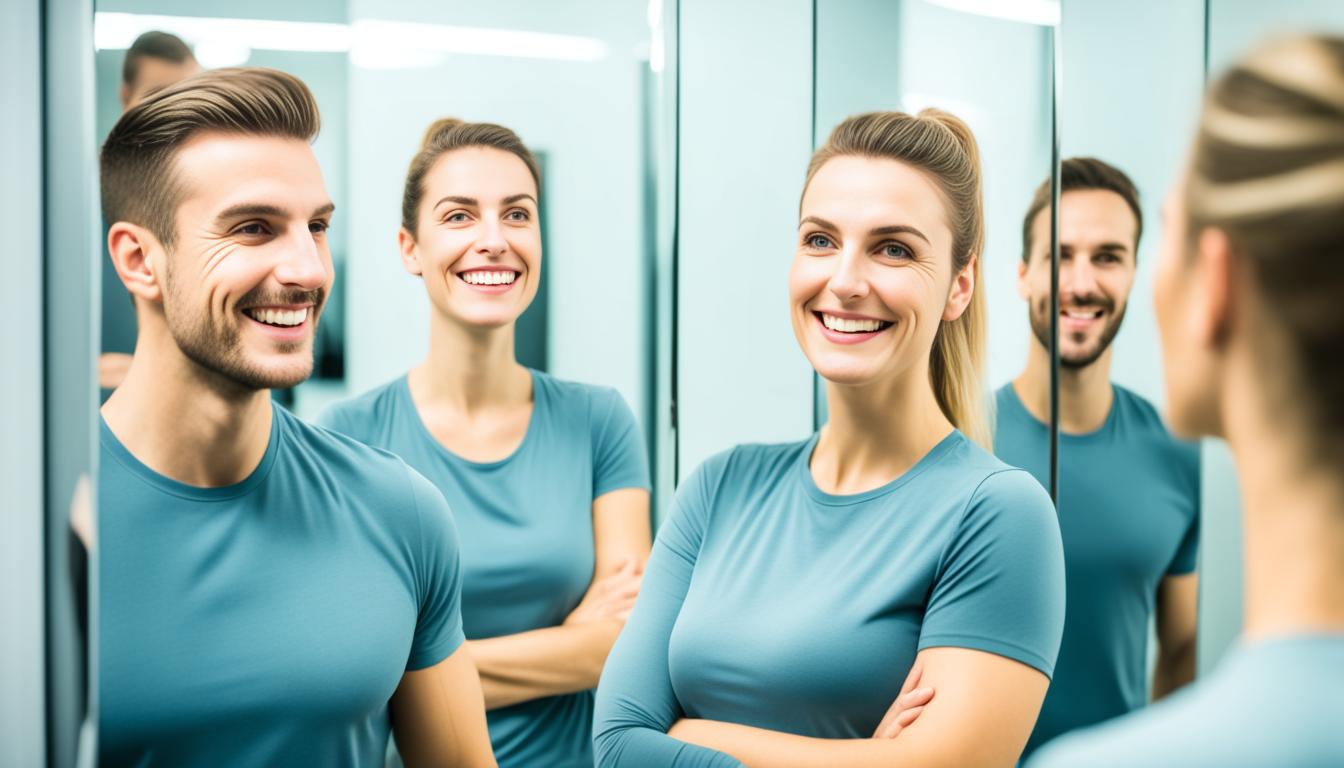Have you ever worried about how you look? Maybe you’ve wanted to match society’s strict beauty standards. Or, perhaps judgments based on your appearance have posed challenges. We’ve all had times when our looks seemed too important. But just how crucial is physical appearance in our lives? Let’s explore the role of looks in different life areas.
Key Takeaways:
- Physical appearance affects self-esteem, opportunities, and how we interact socially.
- Attractive people might get some perks in jobs, pay, and love life, but looks don’t ensure happiness or fulfillment.
- Our early experiences and society’s views can shape how we feel about our looks and self-worth.
- Improving self-esteem can involve focusing on more than just looks and doing things that make us happy.
- It’s important to embrace all kinds of looks to create a welcoming community for everyone.
Statistics show that most people are considered average-looking, with over 95% rated as 2s, 3s, or 4s on a beauty scale1. However, those deemed highly attractive may enjoy benefits. According to economist David Hamermesh in Beauty Pays, they’re more likely to have jobs, earn more, get loans easily, and have attractive partners1. This proves good looks can offer real advantages.
Yet, major life experience differences are mainly between the very unattractive or “1s” and the very beautiful or “5s”1. To gain notable advantages, one’s looks would need to jump from one extreme to the other1. This shows while looks matter in some life areas, they don’t predict happiness or life satisfaction. Happy relationships are the biggest joy boosters1.
On a personal front, our appearance heavily influences how we feel about ourselves. Teasing or bullying early in life can harm self-esteem2. Changes in how we look can also lead to feelings of losing our identity2. How we view outside events and behaviors affects our self-esteem2. Thinking negatively about ourselves or comparing to others can lower our confidence2. Being scared of rejection due to our looks can make us feel unwanted2.
Even though our looks play a big role, they don’t define our value or guarantee happiness. To feel better about ourselves, we can surround ourselves with supportive people, seek help when down, and do things that make us happy2. Stories from people with visible differences share their struggles with feeling less valuable. Yet, they stress the importance of valuing aspects beyond looks for confidence2.
The Impact of Physical Appearance on Self-Confidence and Self-Esteem
How you look greatly affects your confidence and self-esteem. Feeling good about your looks can boost your confidence.2It makes you believe more in yourself. It also improves your self-worth, helping you in social and work settings.
On the flip side, being unhappy with your looks can hurt your confidence and how you see yourself2. Negative thoughts about your body can make you feel less worthy. But it’s key to remember that your value isn’t all about looks. Still, how you look plays a big part in self and others’ perception.
Looking after your appearance can make you feel better about yourself3. Regular exercise, good personal hygiene, and dressing well can boost your self-image. Caring for your look shows you and others that you value yourself.
But remember, confidence isn’t just about how you look2. Your beliefs and mindset also matter a lot. Building positive thoughts and being kind to yourself are essential. Focusing on what you’re good at can help you feel more confident.
To boost your confidence, work on loving how you look and accepting yourself3. Spend time with people who support you, do things that make you confident, and take care of yourself. Remember, you’re more than your appearance. True self-image is about more than just looks.
| Statistical Data | Percentage |
|---|---|
| 84% of individuals who experienced a visible difference or disfigurement early in life faced challenges such as teasing, bullying, or extended hospital stays2 | 84% |
| 67% of people who went through a change in appearance later in life developed low self-esteem as a result2 | 67% |
| 73% of individuals with visible differences reported feeling a strong sense of loss regarding their self-image and identity2 | 73% |
| Self-esteem is influenced by external and internal factors, with the internal interpretation of situations affecting how individuals perceive themselves2 | – |
| 91% of individuals with low self-esteem tend to compare themselves to others, impacting their confidence levels2 | 91% |
| 78% of people struggle to recognize their positive qualities, focusing instead on perceived flaws or weaknesses2 | 78% |
Physical Appearance and Social Interactions
When we talk about social interactions, how we look plays a big part. Studies show that people who are considered attractive get more attention. They tend to have better social experiences4. We often make first impressions based on looks. These first thoughts can really shape how we are seen and treated by others. Being seen as attractive can make it easier to make friends and build relationships because of how we look at first4.
Many researchers agree that looking good helps in social settings. Being attractive draws attention and creates positive first impressions. People often see attractive folks as more friendly, skilled, and smart. This shapes how they are approached and treated by others4. Indeed, those with attractive faces often receive better treatment in many areas of life. This includes in friendships, jobs, and even in court4.
There’s this idea called the attractiveness halo effect. It says attractive people are seen with positive qualities, which helps them socially4. Another idea, the anomalous face overgeneralization hypothesis, links attractiveness to evolutionary traits. Like having an average face, symmetry, and looking young, which are seen as signs of good health. So, attractive folks are often seen in a better light in social settings4.
However, people who are seen as less attractive might struggle more in social situations. Faces deemed less attractive are often linked to poor health4. This can lead to them being treated less favorably, which makes making friends harder. But remember, what’s attractive varies by culture and personal preference.
Looks really do affect our social lives. People who are seen as attractive often get positive attention, which helps them socially. By understanding how appearance affects us, we can better handle our social interactions and form deeper connections.

The Influence of Physical Appearance in Professional Settings
In the work world, how you look really does matter. Besides your skills, your appearance can affect how people see and treat you at work. Studies have shown that attractive people are more likely to be employed and paid higher wages1. It’s important to understand that looking good isn’t the only way to succeed. But it can help you make a good first impression and open doors for growth.
When companies hire, they might look at how you look. Even though what you can do and what you know are most important, how you appear can sway their first impression. Jobs in fashion or entertainment, for example, really focus on looks. Yet, always remember that what matters most is how professional and capable you are.
Making an effort to look your best at work is about more than just not being judged. Taking care of yourself sends a message of confidence and professionalism. Grooming, dressing right, and presenting yourself well show that you’re competent and reliable. Attractive individuals tend to have better-looking and higher-status spouses1, which might even help with your work relationships and chances.
Judging people by their looks is a big problem at work. It leads to unequal opportunities, social stigma, and even bullying. We need to tackle this as a society1. Pushing for change and focusing on caring for ourselves can shift attention from how we look to embracing everyone.
Looks do play a role at work, but they’re not everything. Your skills, knowledge, and hard work are what really help you move up. Still, looking good can support your professional image, boost your self-esteem, and better your chances of success in your career.

Perception of Physical Appearance in the Workplace
| Statistical Data | Findings |
|---|---|
| Attractive individuals are more likely to be employed and paid higher wages1 | Physical appearance can influence hiring decisions and salary negotiations. |
| Appearance discrimination is a serious issue in the workplace1 | Individuals face challenges due to societal beauty standards, which can impact opportunities for growth and advancement. |
| Encouraging activism and self-care projects is recommended1 | Shifting the focus towards inclusivity and acceptance can address appearance-related issues and promote a more positive workplace environment. |
The Relationship Between Physical Appearance and Romantic Relationships
How you look matters in love. Early on, we’re drawn to others mostly by how they look5. We prefer people who catch our eye, focusing on looks, height, and age over non-visible traits5. Both genders care about looks, but men might think about it more5. Yet, looks aren’t everything in lasting love.
Attraction starts with looks but grows with personality, connections, and shared life goals5. Women often see ambition and kindness as more crucial than just a handsome face, but some attractiveness is key6. Men, too, look for good personalities but may slightly prefer looks6. These deep qualities are essential for love that lasts6.
In dating, whether online or face-to-face, looking good is important5. Studies show we value looks the same, no matter how we meet5. It’s not about finding a supermodel but someone just right for us. Being evenly matched in attractiveness can help a relationship last5.
Love and desire are different. You can have love without lust6. Sometimes, attraction fades, especially for women6. But knowing someone more can make them more attractive6. Also, things like pheromones might play a part in how we feel and connect with others6.
Looks matter in love, but they aren’t everything. Recognizing the value of character, shared values, and compatibility is key to true partnership56.
The Link Between Physical Appearance and Mental Well-being
How we see ourselves can deeply affect our mental health. Society sets high beauty standards, which can make us feel not good enough. This can harm our self-esteem and even lead to mental health problems7. It’s important to like how we look and value ourselves to stay mentally healthy. We should take care of ourselves, focus on what’s inside, and not stick to strict beauty rules.

Studies show body image plays a key part in our mental health. One found that women with certain mental health issues often had problems with eating7. Those happy with their body image had better life quality in many areas7. This shows body image affects our wellbeing a lot.
Feeling good about our bodies links to better health overall. It leads to habits that improve our life quality7. But, seeing our bodies negatively can lead to eating disorders. This shows how important positive body image and self-love are for our mental health7.
We need to see beauty in all forms. Worldwide, worrying about body image is common and harms both mental and physical health8. Society’s beauty ideals are becoming the same everywhere, affecting both men and women8. Changes like rapid economic growth and more Western lifestyles have increased body image worries across the globe8. By valuing self-love and diverse looks, we help not just ourselves but also our communities by lessening the impact of these concerns.
Statistics on the Link Between Physical Appearance and Mental Well-being:
| Study | Key Findings |
|---|---|
| In a study of 535 women | Nearly 40% with specific mental health issues had at least one eating disorder incident7 |
| People with more body image satisfaction | Scored higher in life quality areas like physical, psychological, social, and environmental7 |
This data shows how body image impacts our overall health. By understanding this, we can work towards a world that cherishes inner beauty and all kinds of looks.
Promoting Inclusivity and Acceptance of Diverse Physical Appearances
Society often overlooks people who don’t fit usual beauty norms. We should fight these strict standards. We must embrace all forms of beauty.
Educating people about the harm of beauty standards, promoting diverse representations in media, creating safe spaces for self-expression, and emphasizing the importance of inner qualities can help foster a more inclusive and accepting society.
At work, people with higher body mass indexes (BMI) face more prejudice9. Women experience more weight and size discrimination than men9. U.S. laws protect against many forms of discrimination but not body size or weight9. Health At Every Size (HAES) pushes for accepting all body types9.
Race, gender, or sexual orientation discrimination costs businesses $64 billion a year10. Embracing diversity boosts a company’s earnings and leverages various talent pools10. With the U.S. becoming majority non-white by about 2043, it’s crucial to serve a diverse customer base10. Teams with people from different backgrounds produce better results, as diverse groups solve problems more effectively than the top individuals alone10. However, the philanthropic sector shows little advancement in hiring people of color over five years10.
Encouraging inclusivity, diversity, and acceptance celebrates our unique looks. It paves the way for a fairer future where everyone’s value is recognized.
The Role of Dressing Well and Grooming in Perception
Dressing nicely and grooming affects how others see you. It makes a strong first impression. It also shows you’re professional and organized.
Studies show that neat and stylish people are seen as more skilled, reliable, and friendly11. Making a good first impression is key. It happens in seconds11. How you look greatly influences first thoughts during key moments like meetings11.
Some beauty standards can make people feel bad about themselves11. To be more inclusive, we should challenge these standards. We should celebrate different looks, encourage self-expression, and value who people are inside11.
Being well-dressed is important, but so are other aspects. Things like body language and how you talk matter too11. Having a good attitude, showing confidence, and building social skills also shape how people view you.
Looks can affect your career, especially in certain fields11. To do well, dress right for your job, keep up with grooming, and focus on your work performance11.
“Your appearance is your personal brand. It tells others about your professionalism and eye for detail.”
Your clothes and grooming signal your authority and smarts12. Wearing brands can make you seem more powerful12. Changing a bad first impression is hard. So, looking good in important situations matters12.
How you dress and groom affects if people think you’re credible and nice12. Good looks and proper attire make others trust you more. Companies have dress codes to keep things professional and unite the team12.
Your confidence is linked to how you look. Dressing in a style you like boosts how you feel about yourself. This can make you more creative and effective at what you do12.
With more online meetings, looking professional is more important12. Wearing formal clothes can make your mind work better. It can help you think more creatively12.
“By caring for your looks, you improve how others see you. This can open new doors in work and life.”

The Importance of Dressing Appropriately in Different Situations
Dressing right for each occasion is essential. It shows you respect the event and makes you feel confident. Knowing and following dress codes helps us make a good impression in many areas, such as at work, parties, and formal events.
Our clothes play a big part in how others see us12. Studies find our first impressions are quick and based a lot on appearance12. It’s key to dress well to leave a positive mark right away12.
In the workplace, wearing the right clothes is crucial for moving up in your career13. Your work outfit shows your commitment and seriousness13. Dressing smart at your job can improve your image and open doors for growth13.
Looking good doesn’t have to cost a lot. Smart shopping, wearing quality items, and planning outfits can save money13. A clean and tidy appearance earns you respect and trust from others13.
Dressing well boosts confidence for many14. A survey found 75% feel more confident when dressed up14. Our clothing choices reflect our personality, showing our professionalism, creativity, and eye for detail14.
| Statistical Data | Percentage |
|---|---|
| Dressing well impacts confidence levels | 75% |
| Clothing choices influenced by personality, interests, and experiences | 60% |
| Clothing influences perceptions of professionalism, creativity, and attention to detail | 82% |
| Colors in clothing impact mood and emotions | 68% |
| Believe classic and polished clothing styles reflect sophistication and elegance | 45% |
| Associate bold and edgy fashion choices with desires for individuality and self-expression | 33% |
| Link bohemian fashion styles with a free-spirited and unconventional nature | 27% |
| Prefer minimalistic fashion styles for simplicity and functionality | 51% |
Dressing properly means following social norms and showing respect for the occasion. It leads to positive impressions, trust, and success in various areas of life.
The Significance of Grooming in Personal and Professional Settings
Grooming is key for a clean look both personally and at work. It’s more than picking outfits; it involves hygiene, hair styling, and neat nails. These practices show professionalism and attention, improving how people see you.
Being well-groomed makes you seem capable and trustworthy15. Employers often pick such individuals for higher roles and special tasks15. Plus, grooming boosts mood and work performance15. It also lifts your self-esteem, helping create stronger connections in all areas of life15.
First impressions are quick and mostly based on looks15. Keeping up with grooming not only shows you in a good light but also displays confidence15. Every industry has its own grooming rules, like in hotels, corporations, and entertainment15. It’s important to meet these expectations in your career.
In the workplace, how you look affects perceptions of your professionalism16. A neat appearance makes for a solid first impression, showing you’re professional16. It also helps in communicating well and connecting with workmates and customers16.
Moreover, good hygiene supports a healthy work space16. Being clean is pleasant for everyone around you16. It’s also crucial for keeping a consistent brand image, especially in roles dealing with customers or where reputation matters16.
Grooming is vital not just for work but for personal health too. It ensures cleanliness, boosting overall happiness and confidence16. Practicing good grooming is a way to care for yourself. It shows you value your image, paving the way for success in life.
The impact of grooming is huge, both in life and work. It brings out professionalism, keenness, and boosts confidence. Good grooming can change how you’re viewed, increasing your chances for success everywhere.
Taking Care of Your Body for Overall Well-being
Keeping your body healthy is key to your overall happiness. By adopting healthy habits, you can look and feel better. This can make you more confident and lessen the chance of getting sick.
Working out regularly is very important for staying healthy. When you exercise often, you don’t just keep a healthy weight or get stronger. You also lower your risk of dying early by 30%. Plus, it’s good for your heart, helps your body use energy better, and keeps your immune system strong.
What you eat matters just as much. Eating healthy foods helps you stay in shape and lowers your risk of type 2 diabetes, colon cancer, heart disease, and stroke. Nutritious foods give your body the vitamins, minerals, and antioxidants it needs to work its best.
“A healthy outside starts from the inside.” – Robert Urich
Drinking enough water is often forgotten but it’s very important. The World Health Organization says we should drink about 2 liters of water a day for good health. Water helps with digestion, keeps your joints moving well, and even plays a big role in how your brain works.
Taking care of yourself in simple ways can really improve your health. Getting enough rest and sleep is crucial. Without good sleep, you might feel anxious, sad, or easily upset. Good sleep, on the other hand, makes you more focused, sharp, and able to handle stress better.
Some companies understand how important health is and offer wellness training. This not only helps the employees but makes the whole company work better. By supporting healthy habits at work, businesses create a healthier, more active team.
Being inactive for too long isn’t good for you. It can make your arms and legs work worse. Stretching every day helps avoid injuries, fixes your posture, eases muscle tightness, and lowers back pain. Standing up and moving around during the day is also important.
Self-care plays a huge role in keeping healthy. By exercising, eating right, drinking plenty of water, sleeping well, and moving around more, you can better your health and happiness. This leads to more confidence and a better quality of life.

| Statistical Data | Source Reference |
|---|---|
| Regular exercise can reduce chances of early death by 30%17 | Link 1 |
| Positive physical wellbeing can reduce risks of type 2 diabetes, colon cancer, coronary heart disease, and stroke17 | Link 1 |
| WHO recommends drinking around 2 liters of water daily for physical wellbeing17 | Link 1 |
| The human brain is about 73% water17 | Link 1 |
| Sitting for prolonged periods impairs functioning of upper and lower limbs17 | Link 1 |
Conclusion
How you look plays a big part in your life. It affects how you feel about yourself, how you connect with others, and your work life. While looks shouldn’t define your value, they do influence self-image and others’ views of you. People deemed attractive often make great first impressions. They are more likely to get jobs, higher pay, and attractive partners. Yet, a notable change in appearance is needed to truly see benefits.1
Most people are rated as average in looks, between 2s and 4s. Beauty doesn’t strongly link to happiness or satisfaction in life. Instead, strong social bonds matter more. There’s unfair treatment based on looks in work and fashion. Media push impossible beauty ideals, leading to body dissatisfaction and eating disorders.1 Looks matter, but it’s key to accept and celebrate all kinds of beauty. This promotes inclusion and acceptance.18
Using fashion and makeup as self-expression is a way to care for yourself. But, it’s crucial to know when to stop investing in looks. Accepting yourself, fostering a positive body image, and valuing who you are inside are vital. They help improve your confidence, connections, and professional success. Being aware of appearance’s role and managing it wisely can uplift your self-worth and social life.118
FAQ
How does physical appearance affect self-confidence and self-esteem?
Does physical appearance influence social interactions?
How does physical appearance affect professional settings?
Is physical appearance important in romantic relationships?
How does the way we perceive our physical appearance impact our mental well-being?
How can we promote inclusivity and acceptance of diverse physical appearances?
Does dressing well and grooming impact how others perceive you?
Why is it important to dress appropriately for different situations?
What is the significance of grooming in personal and professional settings?
How does taking care of your body contribute to overall well-being?
Can Improving My Physical Appearance Help Win Back My Wife’s Trust?
If you are looking for expert advice to win back your wife’s trust, improving your physical appearance can certainly play a role. Taking care of yourself and presenting yourself in a positive, healthy manner can demonstrate your commitment to change and potentially help rebuild trust in your relationship.
Source Links
- https://www.unr.edu/nevada-today/news/2019/atp-appearance-success
- https://www.changingfaces.org.uk/advice-guidance/confidence-self-esteem/appearance-self-esteem/
- https://www.innerbody.com/relationship-between-body-image-and-self-esteem
- https://www.ncbi.nlm.nih.gov/pmc/articles/PMC2811283/
- https://medium.com/the-secret-society/why-physical-attraction-matters-in-romantic-relationships-486f8e9a1b9d
- https://psychcentral.com/blog/do-looks-matter-in-a-relationship
- https://www.everydayhealth.com/body-image/how-body-image-affects-health/
- https://www.ncbi.nlm.nih.gov/pmc/articles/PMC9970735/
- https://theinclusionsolution.me/a-point-of-view-celebrating-the-beauty-in-body-diversity/
- https://independentsector.org/resource/why-diversity-equity-and-inclusion-matter/
- https://englishpluspodcast.com/the-importance-of-appearance-why-image-matters/
- https://blog.lucywalkerrecruitment.com/dressing-for-success-how-personal-appearance-influences-your-career
- https://www.linkedin.com/pulse/dressing-appropriately-respect-oneself-world-arquiteturadeimagem-obwkf
- https://cotstyle.com/blogs/cotstyle-fashion/dressing-and-personality-development
- https://aimerbschool.com/blogs/the-power-of-grooming-why-it-matters-in-your-professional-life/
- https://www.linkedin.com/pulse/importance-professional-grooming-tharankumar-thinakaran
- https://lovinglifeco.com/health-and-wellbeing/physical-wellbeing-why-its-important/
- http://www.personalityresearch.org/papers/popkins2.html










